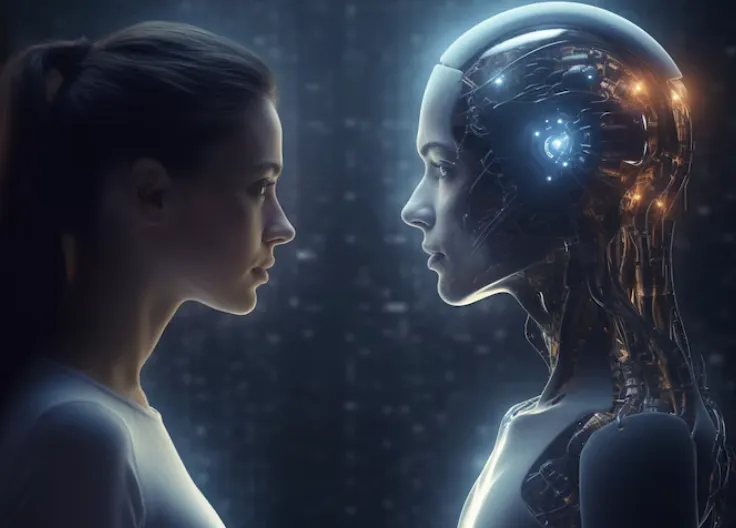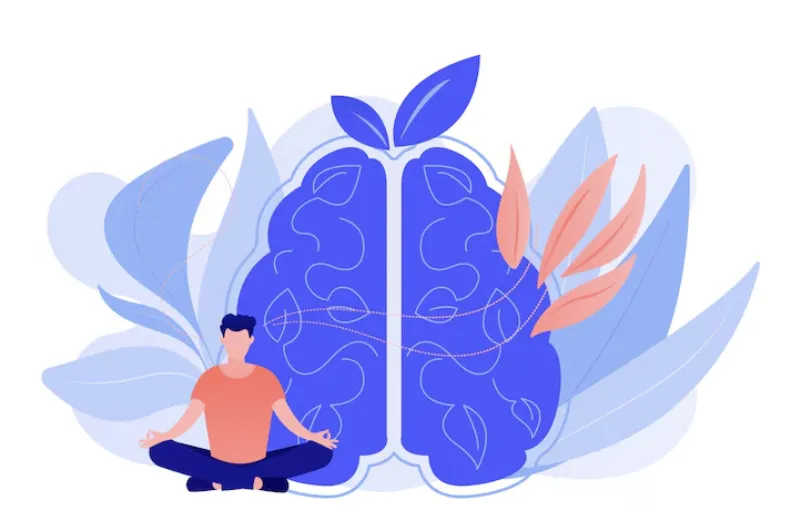Artificial Intelligence and Its Impact on Human Mindset

Artificial Intelligence (AI) is transforming industries and revolutionizing the way we live, work, and interact. Beyond its applications in technology and business, AI is also having a profound impact on our mindset — how we think, make decisions, and perceive the world around us. As AI continues to evolve, its influence on human cognition, behavior, and societal values is becoming more pronounced.
In this article, we will explore how AI is reshaping our mindset in various aspects of life, from decision-making and creativity to our emotional well-being and understanding of reality.
1. AI and Decision-Making: Enhancing or Replacing Human Judgment?
One of AI’s most significant contributions is its ability to process vast amounts of data quickly and efficiently. This capability has made AI a valuable tool for decision-making in fields ranging from healthcare to finance, where complex analysis is required. However, this also raises the question of whether AI will enhance or replace human judgment in the long term.
a. Enhanced Decision-Making
AI systems, such as predictive algorithms, provide individuals and organizations with insights that they would not have been able to obtain on their own. For example, AI can analyze medical data to predict health risks, help businesses optimize their operations, and even suggest personalized educational paths based on learning patterns. In these cases, AI augments human decision-making by offering evidence-based recommendations.
b. The Risk of Over-Reliance
As AI becomes more integrated into our daily lives, there is a risk of over-reliance on AI-generated decisions, potentially diminishing human critical thinking skills. When people begin to trust algorithms over their own judgment, they may become passive in decision-making, relying too heavily on automated systems. This shift could lead to a mindset where we defer to AI without fully understanding its reasoning, potentially resulting in ethical dilemmas or unintended consequences.
2. AI and Creativity: Transforming How We Innovate
AI is also influencing the creative landscape, from art and music to literature and design. AI-generated content, such as digital artwork or machine-composed music, is pushing the boundaries of human creativity. But does AI enhance or threaten our creative mindset?
a. Collaborative Creativity
AI can serve as a creative collaborator, assisting artists, writers, and designers in generating ideas, enhancing productivity, and opening up new creative possibilities. Tools like OpenAI’s DALL·E and GPT models, for example, allow users to create images and text-based content with AI assistance, providing inspiration and reducing creative blocks.
AI’s ability to process patterns and analyze vast amounts of data also allows it to offer novel insights, enabling humans to explore ideas they may not have considered otherwise. In this sense, AI enhances human creativity by acting as a catalyst for innovation.
b. Challenges to Human Creativity
On the flip side, there is concern that AI-generated content might lead to a homogenization of creative output, where algorithms follow predictable patterns, limiting the diversity of ideas. Additionally, some fear that as AI becomes more capable of producing high-quality art, music, or literature, it could reduce the need for human creators, diminishing the value we place on uniquely human forms of expression.
3. AI and Emotional Intelligence: Shaping How We Relate to Ourselves and Others
AI's role in emotional and social contexts is another area where it is impacting human mindset. AI systems, such as chatbots and virtual assistants, are designed to engage with users in human-like ways, affecting how we interact with technology and even with each other.
a. AI as Emotional Support
In the mental health space, AI-powered tools like therapy chatbots (e.g., Woebot) are helping individuals manage anxiety, depression, and stress. These platforms use natural language processing to simulate conversations and offer therapeutic interventions, providing a sense of comfort and support. AI’s ability to respond to emotions in real time is changing the way people think about emotional well-being and mental health care.
b. Human Disconnection
While AI offers convenience and accessibility, there is also a risk of reduced human-to-human interaction as people turn to machines for emotional support. As AI systems become more capable of responding empathetically, we may rely more on virtual companions and less on actual human relationships. This shift in mindset could lead to a disconnection from real-world social bonds and reduce opportunities for genuine emotional growth.
4. AI and Learning: Changing How We Acquire Knowledge
AI is revolutionizing education by personalizing learning experiences, tailoring lessons to individual students’ needs, and automating repetitive tasks like grading. This has profound implications for how we approach learning and knowledge acquisition.
a. Personalized Learning
AI-powered educational platforms can assess students’ strengths and weaknesses, offering customized learning paths and adaptive content. This level of personalization fosters a growth mindset, where learners are encouraged to develop their abilities at their own pace. It also promotes a lifelong learning mentality, as AI tools can help individuals continuously acquire new skills in response to changing career demands.
b. Potential Downsides
However, there is concern that AI-driven education could lead to over-optimization, where the learning process becomes too focused on efficiency and measurable outcomes. In this scenario, creativity and critical thinking may be undervalued, leading to a narrow mindset focused on performance rather than holistic personal development.
5. AI and Ethics: Shaping Our Moral Mindset
The rise of AI has sparked important ethical questions that challenge our moral frameworks. Issues such as data privacy, algorithmic bias, and the potential for AI to perpetuate inequality are prompting society to rethink its values and principles.
a. Algorithmic Bias
AI systems are trained on data, and if that data contains biases (whether racial, gender-based, or socio-economic), the AI can perpetuate and even amplify those biases. This has raised concerns about fairness and justice in AI applications, particularly in areas like hiring, law enforcement, and lending.
These ethical challenges require a shift in mindset, where individuals and organizations become more aware of the potential consequences of AI and take steps to ensure that its development aligns with principles of fairness, transparency, and accountability.
b. AI and Autonomy
As AI becomes more integrated into decision-making processes, there are also concerns about human autonomy. When algorithms are used to make important decisions about employment, medical treatment, or even social services, individuals may feel that their autonomy is being undermined. This prompts philosophical questions about the role of humans in an increasingly automated world and challenges us to consider the ethical boundaries of AI's influence on our lives.





